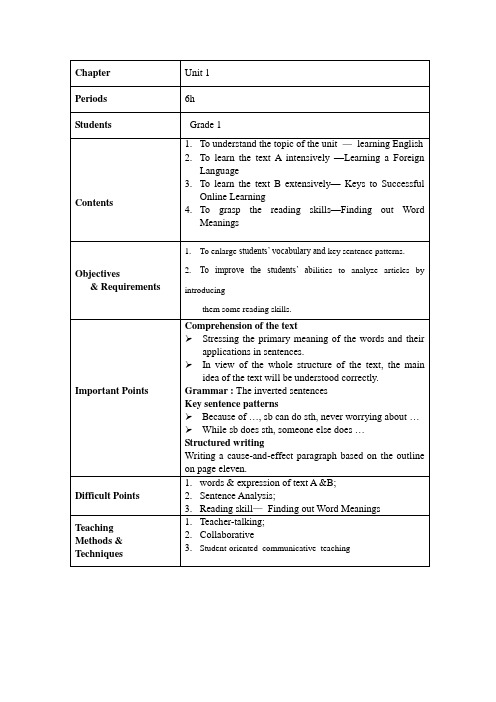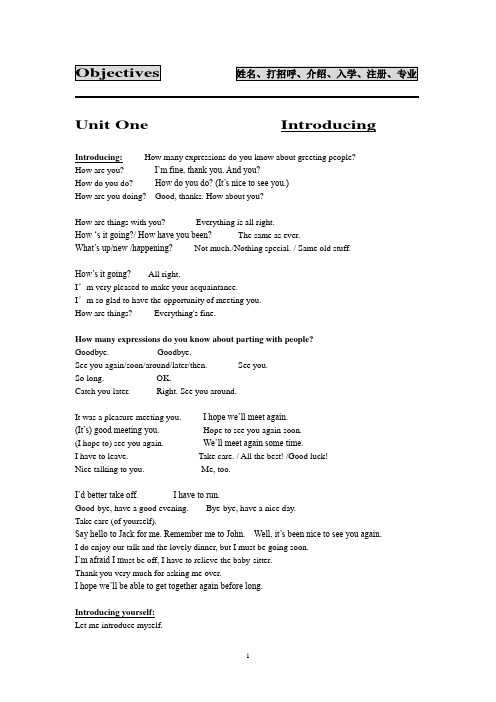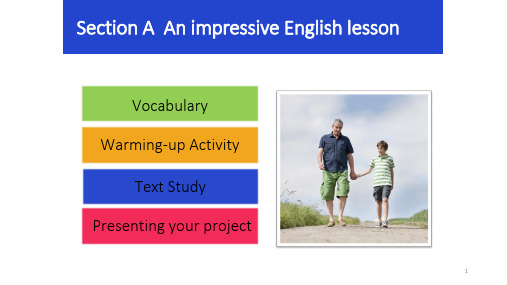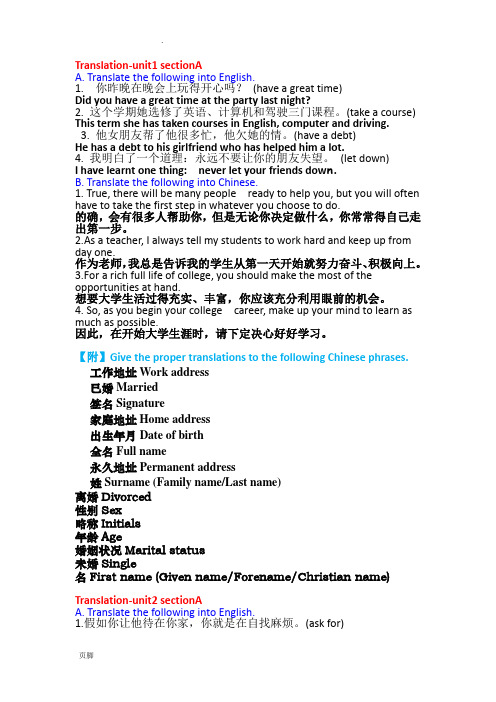小学语法新视野1Unit1
- 格式:doc
- 大小:35.00 KB
- 文档页数:3



Unit One IntroducingIntroducing: How many expressions do you know about greeting people?How are you? I‟m fine, thank you. And you?How do you do? How do you do? (It‟s nice to see you.)How are you doing? Good, thanks. How about you?How are things with you? Everything is all right.How …s it going?/ How have you been?The same as ever.What‟s up/new /happening?Not much./Nothing special. / Same old stuff.How‟s it going?All right.I’m very pleased to make your acquaintance.I’m so glad to have the opportunity of meeting you.How are things? Everything's fine.How many expressions do you know about parting with people?Goodbye. Goodbye.See you again/soon/around/later/then. See you.So long. OK.Catch you later. Right. See you around.It was a pleasure meeting you. I hope we‟ll meet again.(It‟s) good meeting you. Hope to see you again soon.(I hope to) see you again. We‟ll meet again some time.I have to leave. Take care. / All the best! /Good luck!Nice talking to you. Me, too.I‟d better take off. I have to run.Good-bye, have a good evening. Bye-bye, have a nice day.Take care (of yourself).Say hello to Jack for me. Remember me to John. Well, it‟s been nice to see you again.I do enjoy our talk and the lovely dinner, but I must be going soon.I‟m afraid I m ust be off, I have to relieve the baby-sitter.Thank you very much for asking me over.I hope we‟ll be able to get together again before long.Introducing yourself:Let me introduce myself.May I introduce myself? My name is…I‟m a freshman/sophomore…How do you do? My name is…Excuse me, may I take the opportunity to introduce myself as…What kind of factors should we cover when introduce?Your name The place you are from.Your profession/school/department.Your characters. Your hobbies.Some private topicsYour age Your family members Your boyfriend/girlfriend The place you live.How many words do you know about describing one’s characters?optimistic 乐观开朗的pessimistic 悲观的out-going外向的reserved/quiet 内向的easy-going 随和的difficult 难相处的active 活泼的energetic 精力充沛的sweet-tempered 性情温和的open-minded 开放的passionate 充满热情的timid 胆小的,羞怯的independent 独立的shy 害羞的How many expressions do you know about describing one’s hobbies?like/love doing something enjoy doing something be fond of doing sthbe in sth be in favor of doing sth. prefer doing sth. be interested in doing sth.E.G.My name is XX. You can call me XX. Since I am a teacher of university, I have a lot of spare time. In my spare time, I stay at home and sit in front of the computer most of the time. In the vacation, I prefer travelling. I’m a quiet person, but when talking about the travel experience, I can talk off my head. I also enjoy cooking very much but not good at it. I think I am easy-going. I hope we can cooperate well in this term.Unit One Part II Listening SkillsDiscussion Activity Cultural tipDiscussionThe more you know about names, the easier for you to identify them. Now discuss with your classmate and find out how many words and expressions you know about name and explain them.First name/given name/Christian name : (姓名中的)名字a personal name that you are givenwhen you are bornLast name/surname :姓your family nameMiddle name/second name : 中名(在名字与姓之间的另一个名字)the name that comes afteryour first name but is not often used except to identify you formally Full name: 名字全称 a person‟s legal name, including the first, middle, and last names. The middle name is sometimes optionalMaiden name: 妇女的娘家姓 a woman‟s last name before she was marriedNickname:绰号;诨名 a name used informally instead of a person‟s own name, usu. a short form of the actual name or a name connected with one‟s character or historyStage name: 艺名 a name that actors use in their professional career that is different from their real namePen name/pseudonym: 笔名 a name that writers sometimes use so that their real identity is notknownInitials: 姓名的大写首字母the first letters of each of your namesTitle: 头衔an official name that you put in front of your own name that shows your status in societyAlias: 化名,假名 a false name that someone, especially a criminal, uses to keep their identity secretActivityIn this activity, you are supposed to collect as much name information from your classmates as possible and fill in the form given below. In the form, you are provided with one example. Surname FanFirst Name HongfangEnglish Name JoannaNickname Shopping queenPen name The writer Zhou Shuren wrote articles under the pen name “Lu Xun”.Stage Name Wang Fei used to use Wang Jingwen as her stage name.Some Tips:1. If your classmate does n‟t have a pen name or stage name, ask him/her to give an example as shown in the form before.2. Make yourself familiar with the following expressions which may be useful in the activity: What‟s your surname and first name please?Do you have an English name? How to spell it?Have you ever used a pen name or stage name?Could you give an example of stage name/pen name?Have you got any nicknames?3. Now walk around the classroom and try to get as much name information as possible. We‟ll see who will win out in the activity.Cultural tipMany English family names have meanings that are very old. For example, some families were named for the place where they lived, such as Hill, Forest, or Lake, and others were named for their occupation, such as Baker, Hunter, and Smith. Smith refers to a person who works with metal,and Miller refers to a person who makes flour.In the United States and Canada, most people have three names:First name Middle name Last nameAnne Louise LucasIn universities, students usually use titles and last names with their teachers:Hello, Professor Lucas.In English, do not use a title with a first name.Hello, Professor Anne.After marriage, in countries like the U.S. and Japan, it is still a common custom for a woman to take her husband’s surname.Can you give some examples of how your names are used in different situations?Unit One Part III Listening InDiscussion Role-play Debate Activity Cultural tip DiscussionChoose one or two topics from the following lists and discuss it with your partner.1. Campus cards and campus life2. A typical day on campus3. Campus facilities4. Formal and casual English5. My dormWords and Expreesions:ID card dining card library card student numberphoto identification access control medical care school attendance checks Sample:N ow many universities use campus cards to make campus life easy. The cards may include ID card, dining card, library card and so on. And these cards can be integrated into one single card. The card may bear such information as a student number, photo identification, and other registration information. So, it can provide access control to a number of buildings and library facilities. With these cards or card, our campus life has been greatly simplified.Sample:We now can use the card across campus to purchase goods, show identification, check out books, pay for photocopying at the library, and pay for meals. The campus cards make it easy to check student identification. So the efficiency of campus management is improved. The campus cards can also provide such services as dormitory access, school attendance checks and medical care.At S tudents’ OfficeXiao Hu: Good morning, Madam. My name is Hu Xiaoyu.Officer: Good morning, Xiao Hu. Can I help you?Xiao Hu: Yes. I‟m a new student here. Could you tell me the procedure for registration?Officer: Sure. First of all, you need to get enrolled here and pick up your ID card at our office.Then, you need to go to the library and pick up a library card so that you can borrowbooks from the library. Finally, you need to go to your department office and getregistered at your department. The secretary of your department will give you someinformation sheets that contain the itinerary of the induction week.Xiao Hu: Ok, I see. Thank you very much.Officer: My pleasure.At the libraryXiao Hu: Excuse me. I‟m a fre shman from the Social Science Department. I want to collect my library card.Librarian: Certainly. May I see your student ID please?Xiao Hu: Oh, yeah, here it is.Librarian: Thanks. And you need to complete a form for your library card. Your name, please? Xiao Hu: Hu Xiaoyu.Librarian: Ok, that‟s it. And here is your library card.Xiao Hu: Thank you.Times: (从早晨起床到吃晚饭)I‟m waked up by…I have my breakfast at 7 o‟clock. I usually have porridge…Class begins at 8 o‟clock. …With other classmates, I am off to the dining hall, …Supper is normally served at 6:00 p.m. …On a typical weekday morning, I‟m waked up by the alarm at six o‟clock. After struggling to get up, I go to the washroom to brush my teeth, wash my face and comb my hair. Then I get dressed. After dressing, I go to the sports ground, where many students are ready to do morning exercises. I join them.I have my breakfast at 7 o‟clock. I usually have porridge, steamed bread, salted vegetables and an egg. During breakfast I sometimes listen to the news program on the radio and sometimes talk with my classmates.Class begins at 8 o‟clock.While attending a lecture, usually take notes. Sometimes, we have group discussions during the lecture. If there is anything that I don‟t understand, I will ask the teacher to explain it. We have four classes in the morning. The f ourth class ends at 12 o‟clock. I usually get tired and hungry by then.With other classmates, I am off to the dining hall, where many students queue up for lunch. It takes me half an hour or more to buy and have my lunch. In order to save time, I sometimes have my lunch at a small restaurant on campus, where I do not have to stand in a queue. As a rule, I take a short nap after lunch. We have two classes from 1:30 to 3:30 p.m. We have extracurricular activities from 3:30 to 5:30 p.m. I like to play basketball or volleyball with my classmates duringthis time.Supper is normally served at 6:00 p.m. After hurrying through my supper, the first thing I have to do is to finish my homework; the second is to preview my lessons for the next day. Sometimes, I have leisure time to watch TV, to go to the cinema with friends or listen to music in the evenings. I usually go to bed at 11:00 p.m. and then chat with my roommates before falling asleep.Words and Expreesions:Dormitory library parking lot recreation center sports center stadium gymnasium restaurant health center (hospital) coffee shop cafeteria shop bookshop post office bank conference hall lecture building garden kindergartenFormal English:1. longer and more complex ; big words ; avoid slang or vernacular ;2. public speeches, serious and official writings, official meetings, and important social occasions.Casual English:while playing sports, studying with friends; at a bar or informal restaurant; at a party or reunion; with close family members; while hanging out; on a date, at the movies, etc.Words and Expreesions:tiny spacious tidy messy closet couch desk chair pictures on the wall bookshelf dresser toiletries computer bulletin board clip board bunk bed bunk blanket guitar shirts and stuff shower sandals piles of stuff scattered about cram in the closet almost everything slip on class shoesRole-playTry to recall what happened on your registration day. Find your partners and act out the scene with imagination. The following expressions are for your reference.procedure for registration enroll pick up your ID card information sheet itinerary induction week collect the library card complete a formDebate Living on campus V.S. Living off campusYou need to be polite when disagreeing with someone, even someone you know quite well. Avoid the use of “never”, “always”.Refrain from saying “you are wrong”.Don’t disagree with obviou s truthsAttack the idea not the person.Quote sources and numbers.Do not present opinion as facts.Smile when disagreeing.Don‟t win a debate and lose a friend.Keep your perspective—You are just debating.Some Tips:To live on campusMore opportunities to expose oneself to ideas and peopleEasy access to library, school resources, and teachersLess money in terms of accommodation, economicalMore occasions to develop the ability to get along with othersTo live on campusMore freedom and privacy, which are essential for individual developmentQuieter environment, concentrate on our studyIn touch with society, no longer live in the “ivory tower”, isolated from societyGood chance to be independent, cook, do the laundryActivityCount yourselves off with a group number (1-2-3-4). Find the students who have the same number as you and form a group. Each group is supposed to draw up a campus map. If you have difficulty naming a location in English, use sentences to describe it. No Chinese is allowed.We‟ll have the winner of the best map and the winner of the best English.Now look at your map and speak out the location which you have difficulty with and see whether you can find the exact expressions from the map on the next page.Cultural tip College students’ housingS tudent housing at four-year colleges and universities varies greatly. Some institutions require that undergraduate students live in the campus dormitory or in school-approved housing, especially during their first and second years. But most schools allow students to choose their place of living either on or off campus. Off-campus housing may be rented rooms in privately owned homes, or in apartment buildings. Frequently, a student will rent an apartment that costs more than he can afford. He will then sub-lease a portion of the apartment to another student, thus dividing the living cost in half. Both students would then share the same kitchen or the same bathroom.Unit One Part IV Speaking outQuestions Role-play Activity Cultural tip Questions: How many expressions do you know about greeting people?How are you? I‟m fine, thank you. And you?How do you do? How do you do? (It‟s nice to see you.)How are you doing? Good, thanks. How about you?Greeting PeopleHow‟s it going?All right. I‟m very pleased to make your acquaintance.I‟m so glad to have the opportunity of meeting you.How are things? Everything‟s fine.Questions: How many expressions do you know about parting with people?It was a pleasure meeting you. I hope we‟ll meet again.(It‟s) good meeting you.(I hope to) see you again.We‟ll meet again some time.Nice talking to you.I have to leave. I‟m leaving.Parting with peopleI‟d better take off. I have to run. Good-bye, have a good evening.Bye-bye, have a nice day. Take care (of yourself). Say hello to Jack for me.Remember me to John. Well, it‟s been nice to se e you again.I do enjoy our talk and the lovely dinner, but I must be going soon.I‟m afraid I must be off, I have to relieve the baby-sitter.Thank you very much for asking me over. I hope we‟ll be able to get together again before long.Introducing: How many expressions do you know about opening introductions? Introducing yourself:Let me introduce myself.May I introduce myself? My name is…I‟m a freshman/sophomore…How do you do? My name is…Excuse me, may I take the opportunity to int roduce myself as…Questions: How many expressions do you know about opening introductions? Introducing someone else:I‟d like you to meet my roommate…I‟d like to introduce my friend, an American visiting scholar to you.Oh, allow me to introduce … to you.How do you do? My name is…May I introduce Prof. Wang to you?Have you met my Chinese teacher?This is …. He‟s from…Questions: How many expressions do you know about opening introductions? Responding to an introduction:How do you do? Nice to meet you. Mine is… I have heard a lot about you.Role-playRecall the day you first met your classmates, roommates or teachers and act it out with your partner.Hello, my name is…Nice to meet you.Nice to meet you too. My name is … , but you can call me…I‟m from…We are going to be …That‟s great.Role-playDid you ask anyone for advice when you registered for the selective courses? Recall the scene and act it out with your classmates.What do you think I should choose?What do you suggest?What would you do (in this situation)?Can you recommend a professor/course?That’s a good idea.Thanks for the advice.Good suggestion.Sounds like a good idea.I think you shouldMaybe you shouldWhy don’t youIf I were you, I would…In my opinion, you should..Why not..I think it would be better if youI would recommend…ActivityWalk around the classroom with your partner and introduce him or her to the classmates you come across on the way. Your introduction should include some special features of your partner.Click Ref. For some useful expressions.Expressions:I‟d like you to meet my desk mate…He/She‟s from…He/She is your country fellow.He/She is from the same high school as you. He/She is a big basketball fan.He/She is shy/outgoing…He/She is good at acting/singing/writing. He/She has a nickname of bookworm/nerd/geek by friends.Cultural tipG reetings depend upon the relationship one person has with another or upon a person’s position. For example, you would greet a professor on campus as Professor Jones. Mrs. Davenport, who is older, and a retired English teacher, would be greeted as Mrs. Davenport. Among friends it would be “Hi, Jim.”An informal type of person like George might expect something like “Yo GD”which means “Hi, George Donovan.”The kind of greeting is used basically among friends of the same level. But it would be wise for you to leave that kind of expression until later when you get to know the culture and individuals better. The safe way is to stick with “Hi”or “Hello”, but understand you may be greeted with different greetings that you did not learn from a textbook.Of course these different greetings break all the rules you have learned. But that’s what practical, everyday language does. We do it in Chinese, and Americans do it in English. It’s in this rule-breaking way of talking that real communication takes place.Unit One Part V Let’s talkQuestions:Do you like your major? Why did you choose it?What do you think you can learn from your major?Questions:What‟s your major?I major in…/My major is…/I study…I ch ose it because…I think I can learn (how to)…Reference:I chose philosophy as my major as I wanted to study something worthwhile and challenging. It's a difficult subject, but I guess I will have a new appreciation and understanding of the world four years later.Questions:What do you plan to do when you graduate? Do you have any options?Reference:I haven‟t decided yet, and I don‟t know what will happen in four years‟ time. So I willwait and see.I‟m going to be a teacher/tour guide/professor/doctor/engineer…I think I‟d like to work for a travel agency.I don‟t know but one thing is for sure that I will do something closely connected with mymajor.Question:Is the college the same as what you expected before?Not exactly. My dream campus should have a beautiful lake so that I can have a walk around it every morning. And I expected to share a room with three classmates, but it turned out to be seven!I don‟t quite like the food in the cafeteria, either. The only thing I like is the li brary here. I like the environment there and I can always find what I want to read. There are also some multi-media language study rooms where I can learn English.Question: How do you cover the cost of college life?My parents paid the tuition for me for the first school year. But I hope I can win the scholarship to pay my tuition for the other three years. I have to study really hard, of course. And maybe I can work part-time next semester. But the most important thing is to find out what I can do.Role-play Act out the scenes based on the following situations.A is running out of money and asks for favor from B. ButB refuses to lend money. A explains that he has spent all the money on tuition and textbooks. B suggests that A should earn money by working part-time. A says that he knows nobody off the campus and doesn‟t know what to do. B advices A to work as a part-time tour guide on weekends as A‟s English is rather good. A thinks it‟s a good idea.Sample:A: Can you do me a favor?B: What‟s up?A: I‟m short of cash recently, you know.B: Not again! You always run out of money!A: That‟s not my fault. All the money my parents gave me was used to pay the tuition and to buy all those textbooks. And I don‟t want to ask them for more.B: Then why not earn some money by yourself?A: I‟m a newcomer of the city and I know nobody off the campus.B: Maybe I can help you.A: But what can I do?B: Your English is very good. Maybe you can work part-time as a tour guide on weekends.You may show some foreign tourists around the Summer Palace, for example.A: Oh. That‟s a good idea. And I like meeting new friends.B: Now let‟s check the tour guide office and see whether there is a vacancy.A: OK. Thanks so much!Cultural tipW hen students enroll in a course, professors provide them with a syllabus, or outline, of the course. The syllabus describes how the course will be taught. It includes a list of the required books and articles students are to read; the schedules and descriptions of course examinations, papers, and other assignments; and an explanation of methods used to evaluate or grade student performance. Methods of instruction may be a lecture, lecture-discussion, discussion, laboratory, seminar, internship, clinical experience, community service, long distance education, or a combination of theses and other formats.American colleges and universities work hard to get their students to think independently. Professors welcome questions and challenges to current thought. In fact, oftentimes grades depend on a student‟s class participation. When a student asks a foolish question or (make) errors in his thinking he does not lose face with the American professor. Rather, he loses face for not thinking and not questioning what he reads or is taught in the lecture.。


Translation-unit1 sectionAA. Translate the following into English.1. 你昨晚在晚会上玩得开心吗?(have a great time)Did you have a great time at the party last night?2. 这个学期她选修了英语、计算机和驾驶三门课程。
(take a course) This term she has taken courses in English, computer and driving.3. 他女朋友帮了他很多忙,他欠她的情。
(have a debt)He has a debt to his girlfriend who has helped him a lot.4. 我明白了一个道理:永远不要让你的朋友失望。
(let down)I have learnt one thing: never let your friends dow n.B. Translate the following into Chinese.1. True, there will be many people ready to help you, but you will often have to take the first step in whatever you choose to do.的确,会有很多人帮助你,但是无论你决定做什么,你常常得自己走出第一步。
2.As a teacher, I always tell my students to work hard and keep up from day one.作为老师,我总是告诉我的学生从第一天开始就努力奋斗、积极向上。
3.For a rich full life of college, you should make the most of the opportunities at hand.想要大学生活过得充实、丰富,你应该充分利用眼前的机会。

III.1.The years he spent in the countryside proved to be a(n)rewarding experience.2.You can learn a lot from this online course.It is designed to help people communicate better through speech and writting.3.Over a third of the population was estimated to have no access to health service.4.Asking too many personal questions during an interview can lead to a(n) embarrassing situation.5.D on’t just conplain about what’s wrong with it;suggust some positive ways to solve the problem.6.No one in the class could match John’s hard work and commitment to study ,which is why the professor liked him.7.The website allows you to take a(n) virtual tour of the well-known city which was there about 2,000 years ago.8.Those who dare not answer questions in a traditional classroom can easily enjoy the benefits of online courses.9.He couldn’t join the police because he was below the minimum height allowed by the rules.10.Many new opportunities will be opended up in the future for future for those with a university education.11. If the bike appeals to you that much, why not buy it? You just got paid yesterday.12. He managed to hide his identity and moved to a new town where people would not know him.13. All of your concern was for nothing, because I was safe all night.14. It was worse than horrible; the smell in the room was so disgusting that it actually made me sick.15. I wasn’t quite angry, but I was a little upset when my noodles were cooked poorly.16. Modern music may have a negative influence as well as a positive one on teenagers.17. He has made an offensive remark that angers all of us.18. On hearing the news, the mother burst into tears and rushed out of the room, followed by a few other people.19. I bought some computer paper, but when I got it home I found it was the wrong stuff.20. I want you to be very thorough when you look in the park for the missing woman so you won’t miss her.21. Inwardly I was very unhappy with what he had said,but I didn’t show it.22.I deeply regret to inform you that we cannot accept such conditions.23.He translated books not only from English,but also,on occasion, from French.24.The young couple complained about the high cost of visiting Europe.25.He had repeatedly urged her to come to the United States to join him,but she refused to leave her homeland.erment officials visited the flood area on Thursday morning to coordinate the relief efforts.27.He showed great reluctance in signing the agreement ,but he finally did it.28.Driving his new red sports car,he was sure his neighbors were looking at him with envy.29.You will have to adjust yourself to a completely new life in the United States when you get there.30.We were amazed to hear he news that well-known writer,in her late eighties, was still writing a book.31.He suddenly became conscious that he was the only man who wasn’t wearing a suit at the party.32.My sister has been really depressed since she lost her job.33.The ages of the students in our online school ranges from 20 to 40.34.I remember that when I was a child I was very impressed with how many toys you had.35.Although my chance encounter with this famous artist was 30 years ago,I still remember it very well.36.After a brief introduction by the chairman,the speaker began her lecture on how to make a good impression.37.We decided to paint the doors blue to match the walls.38.We are often attracted to another person because of their physical appearance ,and sometimes because of their ideas, opinions, goals.39.He relaxed himself by listening to his favorite song before he addressed the meeting.40.In a formal interview ,you should always try to maintain good eye contact with the interviewers.41.Once you have had the disease,you are immune to it for the rest of your life,which means that you cannot get it again.42.Though he worked very hard,it took him a long time to acquire the skills he needed to become a professional artist.43.The spread of international crime and corruption constitutes a major threat to the global economy.44.Each of us might define the concept of freedom in a slightly different way.45.It predict that 300 million people will become infected in the next ten years and,without treatment,each victim will infect 10 to 15 others every year.46.This story,which tells about a man protecting his wife and children, illustrates how important the family is in Asian culture.47.At the airport,people stood behind a metal fence waiting for passengers to emerge from customs.48.When applying for a job, make sure you emphasize the skills and knowledge you have that an employer would find important to the job.49.There is no doubt that this new type of tire represents a major advance in road safety;you feel safer when driving on the highway.50.When they found out his identity, they threatened to kill him if he did not respond to their demands.IV.1.After twenty years as a chain smoker, Mr. Nathe has given up the habit.2.I hope that our talk has given you some insights into the kind of work that we’ve been doing.3.It was clear that much of what he said was far from the truth. Anyone with common sense would have a hard time believing it.4.You have to be patient with small children, since they cannot tell the difference between right and wrong.5.Hard as they tried, the newspaper reporters couldn’t get access to the building where the murder had taken place two hours before.6. He was so ill that he was unable to keep up with what was going on.7.The time has come for us to reap the benefits of the strong foundations we laid in science and technology. of 8. He wished to have the opportunity to participate in the sports meet.9.Even though they are poor, they are against the plan to trade land for goods and money.10.I’m doing this to create circumstances under which we can communicate with each other easily.11.Sandy’s father could not stand the offensive music so he asked her to turn it off/down.12.I can’t turn the tap off , and there’s water all over the floor.13.He is busy as usual giving lectures and working on the textbook.14.She asked the students who were working in the dark classroom why they hadn’t turned the lights on.15.Sinking in the sand,he reached for his friend’s hand,but it was too far away.16.Teachers may exercise more influence on/upon their students than parents.17.The rock and roll music appeals especially to young people.18.I’d like to talk your offer over with my wife before deciding whether to take it or not.19.The money offered may not be much but in any case I’ll take the job.20.Perhaps listening to light music may get rid of some of knots in your stomach.21.They engaged in a serious discussion for several hours without reaching any important decisions.22.We hope all children can live in a world free of violence.23.He is home on leave from the Navy now, and he’ll be at home for another two weeks.24.He visits the bookstore at the subway station on occasion to see whether any new books have come out.25.Will you see to it that this letter gets posted today? It has to reach the head office before Thursday.26.I was in a nightclub in New York when a fire broke out.27.It has been hard to adjust to the idea of being a junior clerk, but now I enjoy it.28.No one would willingly subject himself to such rude treatment.29.In evaluating applicants, this company leans heavily on interviews.30.The police received several complaints about the noise from the party held by our next-door neighbor.31.These students are committed to the cause of helping those who are not able to help themselves.32.Don’t joke with Linda; she takes everything far too seriously.33.For the next two hours she was absorbed in the film, which turned out to be as good as she had hoped.34.He has given up running in order to focus on the long jump.35.Once he made up his mind to do something, there was no stopping him. 36Would you please turn the radio down while I’m reading?The loud noise is driving me crazy.37.In this store, you can find a wide variety of TV sets with pricesranging from $500 to$1000.38.She didn’t feel at her best in the match.That’s why she lost the games.39.It is only a test you’ve failed. Lighten up; it’s not a matter of life or death.40.She was so shy that she kept her eyes on the floor while talking to the class.41.Everyone has the right to live where he wants to, regardless of the color of his skin.42.The disease is spreading,and all the children under five are at risk .43.Outside the Embassy,students were handing out leaflets to everyone who passed by.44.Tom admits that watching TV sometimes distracts him from his homework.45.We will not have the picnic unless more people sign up for it.46.People can only be infected with HIV in a limited number of ways.47.Doing exercises regularly can guard against a number of ways.48.A lot of people don’t feel comfortable with/about speaking in public.urence visited us in place of John who was unfortunately ill.50.Women suffering from iron deficiency can take supplements in the form of tablets.VIII1.对于网络课程,学生不仅可以选择何时何地学习,在回答问题之前他们还可以有时间思考答案。
新视野一册Unit1课堂教案
Time课次1
Lesson type课程类型: New lesson
Contents 教学内容:Unit1 不定冠词a and an Purposes 教学目标:
1.让学生熟悉如何正确的使用不定冠词a an的用法,一般
情况下a是用在以辅音字母开头的单词前,如:a pen. an 是用在以元音开头的字母前,如:an apple.
2.学会简单的口语对话:I have a pen. I have an apple.
3.学会用There be句型来表达,某地有某物:There is a book
on the desk.
Key words 重点单词:A an
Key structures 重点句型:There is a/an...
Teaching tools 教具:
1.文具类:书本钢笔铅笔实物。
2.水果类:苹果香蕉的图片等等。
第一节课
一. Greeting
1.老师跟孩子们打招呼。
T: Hello,everyone.How are you
today? S: I’m fine.
二. Warm up
1.sing a song: <little star>
Little little little star…
三. 口语和单词
1.把一些文具类实物(钢笔书本铅笔)放在桌子上,让学
生们读: A pen. A book. A pencil.
2.将一些水果类图片拿出来,让学生来说:A banana. A
pear. An apple.There is an apple on the desk.
四. Presentation:
1.老师拿一支蜡笔,放在一张椅子上,学生们一起说:
There is a crayon on the chair.
2.同样老师拿一个香蕉放在桌子上:There is an apple on
the desk.
五. Practice:
1.老师左手拿以辅音字母开头的实物单词:pen pencil
rubber book.右手拿以元音字母开头的实物单词前:
apple egg umbrella
2.学生们看见左手的实物就说:A…
学生们看见右手的实物就说:An…
3. 学生上来充当老师,上台来做同样的动作,其余的学生在下面说:A pencil/pen an apple/umbrella…六.Review:
1.在次把a an复习一遍:a pen a pencil an apple an egg an umbrella
七.sing a song<little star>
八.布置作业和奖励表扬时间:
1.记得回家把书上的练习题做完,把课本上的单词在家读五遍。
2.今天上课表现很棒的学生有…
九.随堂家长会:
1.把今天上课的内容给家长说一下。
2.今天孩子们有哪些知识点,掌握的还可以,有哪些还不是很熟练,在家好好练习下。
3.下次课上课的时间,在说一下。